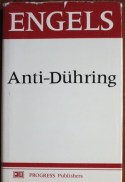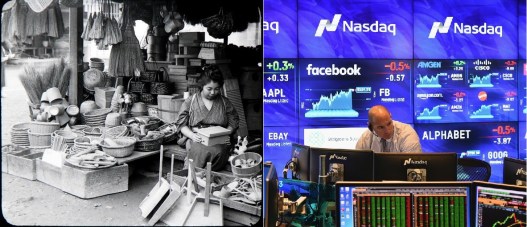In December 1867 a German positivist philosopher and economist Eugen Dühring published a critical review of Karl Marx’s Capital. Dühring, inter alia, disapproved of the Marxist labour theory of value and asserted, based on his own concept of “ethics of sympathy”, that a dichotomy between capitalist and proletariat is unnecessary.
A decade later, as Dühring’s views had found some disciples among the German Social Democrats, Friedrich Engels (following his discussions with Marx) wrote a series of elaborate responses which which were later assembled into Anti-Dühring (first entitled Herrn Eugen Dührings Umwälzung der Wissenschaft – Eugen Dührings’s Revolution in Science, 1877–78), debunking Dühring’s ideas, analysis, and his “vulgar Materialism”. But more broadly, Anti-Dühring is Engels’ major contribution to the exposition and development of Marxist theory. This fascinating and acute polemic (to which, by the way, Marx contributed too) holds profound observations in its three chapters (Philosophy, Political Economy, and Socialism) and I’m calling on you to delve into them.
This post, however, focuses on a definition of political economy, as it is articulated at the beginning of the second chapter. The following paragraph not only reflects, what I term, the ontological embeddedness of State-Economy-Society, but it also emphasizes that this embeddedness is essentially dynamic; namely that institutional change is an intrinsic feature of any political economy and therefore every intellectual endeavour to unravel the mazes of socio-political morphology of the economy must take this insight into account.
“Political economy, in the widest sense, is the science of the laws governing the production and exchange of the material means of subsistence in human society. Production and exchange are two different functions. Production may occur without exchange, but exchange — being necessarily an exchange of products—cannot occur without production. Each of these two social functions is subject to the action of external influences which to a great extent are peculiar to it and for this reason each has, also to a great extent, its own special laws. But on the other hand, they constantly determine and influence each other to such an extent that they might be termed the abscissa and ordinate of the economic curve.
The conditions under which men produce and exchange vary from country to country, and within each country again from generation to generation. Political economy, therefore, cannot be the same for all countries and for all historical epochs. A tremendous distance separates the bow and arrow, the stone knife and the acts of exchange among savages occurring only by way of exception, from the steam-engine of a thousand horse power, the mechanical loom, the railways and the Bank of England. The inhabitants of Tierra del Fuego have not got so far as mass production and world trade, any more than they have experience of bill-jobbing or a Stock Exchange crash. Anyone who attempted to bring the political economy of Tierra del Fuego under the same laws as are operative in present-day England would obviously produce nothing but the most banal commonplaces. Political economy is therefore essentially a historical science. It deals with material which is historical, that is, constantly changing; it must first investigate the special laws of each individual stage in the evolution of production and exchange, and only when it has completed this investigation will it be able to establish the few quite general laws which hold good for production and exchange in general.” (Engels 1877)

Open Access PDF of this post is archived on Zenodo.
For academic citation of this post, always use the following DOI:
https://doi.org/10.5281/zenodo.17765169
***
Join Economic Sociology & Political Economy community via
Facebook / Twitter / LinkedIn / Whatsapp / Instagram / Tumblr / Telegram
Discover more from Economic Sociology & Political Economy
Subscribe to get the latest posts sent to your email.

[…] See also: Emile Durkheim’s definition of Economic Sociology and Friedrich Engels definition of Political Economy […]
LikeLike
[…] also: Joseph Schumpeter’s definition of Economic Sociology and Friedrich Engels’ definition of Political Economy “Il y a enfin les institutions économiques: institutions relatives à la production des […]
LikeLike
[…] What is Political Economy? It is Essentially a Historical Science […]
LikeLike
[…] An open access to the book: Ricardo, David. 1817. On The Principles of Political Economy and Taxation // See also: Friedrich Engels’ definition of Political Economy […]
LikeLike
One of the interesting part of Engels’s “Anti-During” book in my opinion is his introduction where he
wrote Marx’s ideas of the Dialectic Method and its application and connection with the philosophical thinking and its historical evolution.
LikeLiked by 1 person
[…] https://economicsociology.org/2016/08/27/what-is-political-economy-it-is-essentially-a-historical-sc… […]
LikeLike